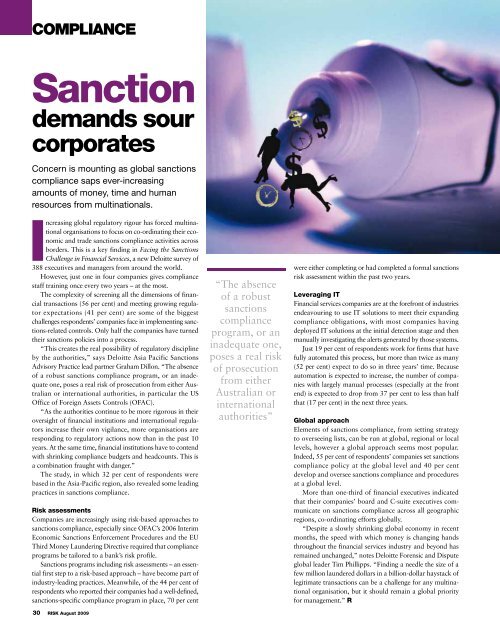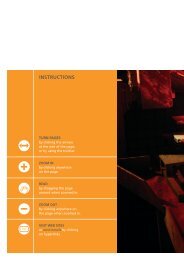MAGAZINE - Realview
MAGAZINE - Realview
MAGAZINE - Realview
Create successful ePaper yourself
Turn your PDF publications into a flip-book with our unique Google optimized e-Paper software.
COMPLIANCE<br />
Sanction<br />
demands sour<br />
corporates<br />
Concern is mounting as global sanctions<br />
compliance saps ever-increasing<br />
amounts of money, time and human<br />
resources from multinationals.<br />
Increasing global regulatory rigour has forced multinational<br />
organisations to focus on co-ordinating their economic<br />
and trade sanctions compliance activities across<br />
borders. This is a key finding in Facing the Sanctions<br />
Challenge in Financial Services, a new Deloitte survey of<br />
388 executives and managers from around the world.<br />
However, just one in four companies gives compliance<br />
staff training once every two years – at the most.<br />
The complexity of screening all the dimensions of financial<br />
transactions (56 per cent) and meeting growing regulator<br />
expectations (41 per cent) are some of the biggest<br />
challenges respondents’ companies face in implementing sanctions-related<br />
controls. Only half the companies have turned<br />
their sanctions policies into a process.<br />
“This creates the real possibility of regulatory discipline<br />
by the authorities,” says Deloitte Asia Pacific Sanctions<br />
Advisory Practice lead partner Graham Dillon. “The absence<br />
of a robust sanctions compliance program, or an inadequate<br />
one, poses a real risk of prosecution from either Australian<br />
or international authorities, in particular the US<br />
Office of Foreign Assets Controls (OFAC).<br />
“As the authorities continue to be more rigorous in their<br />
oversight of financial institutions and international regulators<br />
increase their own vigilance, more organisations are<br />
responding to regulatory actions now than in the past 10<br />
years. At the same time, financial institutions have to contend<br />
with shrinking compliance budgets and headcounts. This is<br />
a combination fraught with danger.”<br />
The study, in which 32 per cent of respondents were<br />
based in the Asia-Pacific region, also revealed some leading<br />
practices in sanctions compliance.<br />
Risk assessments<br />
Companies are increasingly using risk-based approaches to<br />
sanctions compliance, especially since OFAC’s 2006 Interim<br />
Economic Sanctions Enforcement Procedures and the EU<br />
Third Money Laundering Directive required that compliance<br />
programs be tailored to a bank’s risk profile.<br />
Sanctions programs including risk assessments – an essential<br />
first step to a risk-based approach – have become part of<br />
industry-leading practices. Meanwhile, of the 44 per cent of<br />
respondents who reported their companies had a well-defined,<br />
sanctions-specific compliance program in place, 70 per cent<br />
30 RISK August 2009<br />
“The absence<br />
of a robust<br />
sanctions<br />
compliance<br />
program, or an<br />
inadequate one,<br />
poses a real risk<br />
of prosecution<br />
from either<br />
Australian or<br />
international<br />
authorities”<br />
were either completing or had completed a formal sanctions<br />
risk assessment within the past two years.<br />
Leveraging IT<br />
Financial services companies are at the forefront of industries<br />
endeavouring to use IT solutions to meet their expanding<br />
compliance obligations, with most companies having<br />
deployed IT solutions at the initial detection stage and then<br />
manually investigating the alerts generated by those systems.<br />
Just 19 per cent of respondents work for firms that have<br />
fully automated this process, but more than twice as many<br />
(52 per cent) expect to do so in three years’ time. Because<br />
automation is expected to increase, the number of companies<br />
with largely manual processes (especially at the front<br />
end) is expected to drop from 37 per cent to less than half<br />
that (17 per cent) in the next three years.<br />
Global approach<br />
Elements of sanctions compliance, from setting strategy<br />
to overseeing lists, can be run at global, regional or local<br />
levels, however a global approach seems most popular.<br />
Indeed, 55 per cent of respondents’ companies set sanctions<br />
compliance policy at the global level and 40 per cent<br />
develop and oversee sanctions compliance and procedures<br />
at a global level.<br />
More than one-third of financial executives indicated<br />
that their companies’ board and C-suite executives communicate<br />
on sanctions compliance across all geographic<br />
regions, co-ordinating efforts globally.<br />
“Despite a slowly shrinking global economy in recent<br />
months, the speed with which money is changing hands<br />
throughout the financial services industry and beyond has<br />
remained unchanged,” notes Deloitte Forensic and Dispute<br />
global leader Tim Phillipps. “Finding a needle the size of a<br />
few million laundered dollars in a billion-dollar haystack of<br />
legitimate transactions can be a challenge for any multinational<br />
organisation, but it should remain a global priority<br />
for management.” R

















